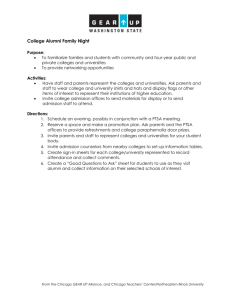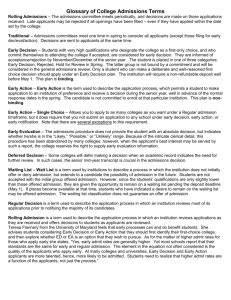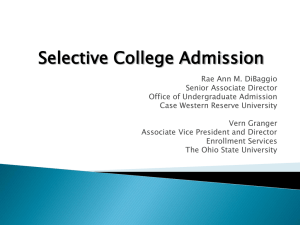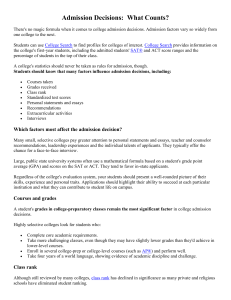university glossary
advertisement
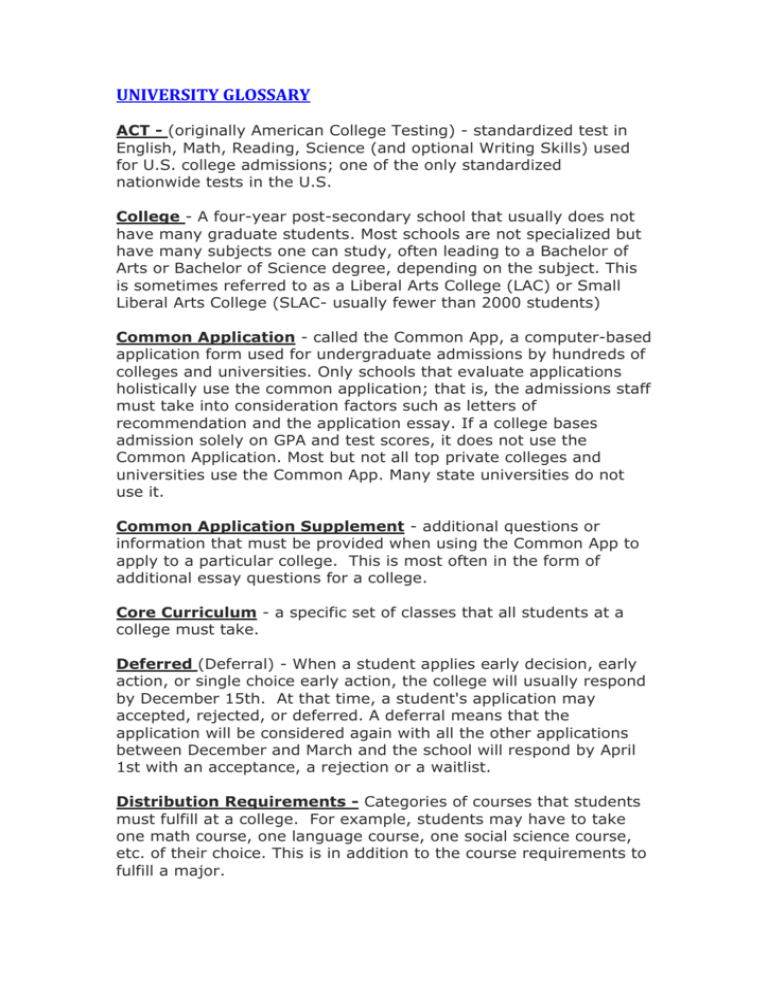
UNIVERSITY GLOSSARY ACT - (originally American College Testing) - standardized test in English, Math, Reading, Science (and optional Writing Skills) used for U.S. college admissions; one of the only standardized nationwide tests in the U.S. College - A four-year post-secondary school that usually does not have many graduate students. Most schools are not specialized but have many subjects one can study, often leading to a Bachelor of Arts or Bachelor of Science degree, depending on the subject. This is sometimes referred to as a Liberal Arts College (LAC) or Small Liberal Arts College (SLAC- usually fewer than 2000 students) Common Application - called the Common App, a computer-based application form used for undergraduate admissions by hundreds of colleges and universities. Only schools that evaluate applications holistically use the common application; that is, the admissions staff must take into consideration factors such as letters of recommendation and the application essay. If a college bases admission solely on GPA and test scores, it does not use the Common Application. Most but not all top private colleges and universities use the Common App. Many state universities do not use it. Common Application Supplement - additional questions or information that must be provided when using the Common App to apply to a particular college. This is most often in the form of additional essay questions for a college. Core Curriculum - a specific set of classes that all students at a college must take. Deferred (Deferral) - When a student applies early decision, early action, or single choice early action, the college will usually respond by December 15th. At that time, a student's application may accepted, rejected, or deferred. A deferral means that the application will be considered again with all the other applications between December and March and the school will respond by April 1st with an acceptance, a rejection or a waitlist. Distribution Requirements - Categories of courses that students must fulfill at a college. For example, students may have to take one math course, one language course, one social science course, etc. of their choice. This is in addition to the course requirements to fulfill a major. Early action (EA) - is an accelerated college application process in which students typically must complete their applications by November 1st. In most cases, students will then receive a decision from the college by mid-December. Early action is NOT BINDING. Colleges generally have EITHER early decision or early action. In general, early action is a more attractive option than early decision. Some reasons to consider early action include: At many colleges, the acceptance rates are higher for early action than for regular admission. Students who are not accepted early but are deferred are still considered for admission with the regular admission pool. Early action is not binding - students are free to apply to other colleges. Students can apply early action to other colleges. Although students receive early notification of an acceptance, they do not need to make a decision until the usual May 1 deadline. This allows time to figure out financial aid. Even if accepted early, a student can choose to go to a different college with no penalty. You must let the school know by May 1st if you are going to attend or not. Early Decision (ED) - an accelerated college application process in which students typically must submit their applications by November 1st. Early decision is a way of demonstrating to the college that their school is a student's first choice and that, if accepted, he or she will definitely attend. In most cases, students will receive a decision from the college by mid-December. Early decision is BINDING. If admitted, a student must attend the school the following September (barring financial issues). A student may apply to only one college early (although additional applications for regular admissions are allowed). If accepted, a student must withdraw all other pending college applications. Frequently the acceptance rate is higher for early decision than it is for regular admissions. This is due in part to the fact that legacies and recruited athletes are more likely to apply early decision and they tend to have a higher acceptance rate. Also, colleges are interested in accepting qualified students who they know will definitely attend the school. Students who aren't accepted early but are deferred are still considered with the regular applicant pool (see Deferred) and will have the final response in April. Students who are accepted early decision are finished with the college process in December of senior year. Financial Aid - A combination of grants and loans that may be given by a college based on the financial need of a student's family. Financial aid generally varies from year to year, based on the family's previous year's income, expenses and assets. Financial Need - a calculation based on a family's income and assets to determine potential grants and/or loans for a student's education given by the college or government. Fraternity - a male social organization at a college. Grant - a scholarship given by a college or other organization; these funds do not have to be paid back. A grant may be given for financial need or other reasons (merit, athletic...). Greek Life - Fraternities and sororities Hook - a particular characteristic of an applicant that makes him/her especially interesting to a college. Hooks include: legacy, under-represented minorities, recruited athletes, first generation college, large donor family, child of celebrity or high-level politician, nationality from under-represented country (or state). Legacy - applicant whose parents or grandparent graduated from the college (they are alumni). Having siblings who attended the college does not constitute legacy. Merit Scholarship - a grant from a college based on the strong academic history of the student. This scholarship is not financial need-based; it is given as a "reward" for strong grades and as an incentive to attend the college. Need Blind - A college does not take into account a student's financial aid needs when making their application decisions. Oxbridge - (UK) The combined term for Oxford and Cambridge universities Peer Review - for some colleges, an additional essay that must be written by a PEER of the applicant; a sibling or friend, not an adult, discussing the applicant. Personal Statement - (UK) a statement submitted by the student with his/her application for UK university focusing on: - why you want to study a particular subject - how you are right for the course - what related work or reading you've done outside the classroom - how it's relevant to your course - how this relates to your chosen career path or long-term plan - etc. Post-secondary School - college or university (after high school). Prépa - (FR) Classe préparatoire; a two-year post-lycée program leading to a nation-wide competitive examination into a "Grande école." May be in sciences, math, humanities, economics, etc. Recruited Athlete - being invited to join a specific college's athletic team during the application process; a coach's interest in the athlete may help the student gain acceptance into the college. Rolling admission, an application process that typically opens up in the early fall, and may continue right through the summer, giving students a large window in which to apply. Rolling admission is more common in state universities than in private colleges. Unlike a regular admission process with a firm application deadline, rolling admission applicants are often notified of their acceptance or rejection within a few weeks of applying. A college with rolling admission typically accepts applications for as long as spaces are available. Applicants should realize, however, that it is a mistake to view rolling admission as an excuse to put off the application process. In many cases, applying early improves an applicant's chance of being accepted. Also, while there may be no application deadline, there typically are deadlines for scholarships, financial aid and housing. A late application may make it impossible to get any decent financial aid. Rolling admission can offer a student several perks: Applicants may receive a decision long before the March or April notification period of regular admission colleges. Applying early can improve an applicant's chance of being accepted. Applying early may improve an applicant's chance of receiving a scholarship. Applying early may give an applicant first choice for housing. Some rolling admission colleges still give students until May 1 to make a decision; this allows an applicant to weigh all options. A student who applies early and is rejected may still have time to apply to other colleges with winter deadlines. Rolling admission colleges may remain an option if a student gets rejected elsewhere; some rolling admission colleges accept applications right up until classes start Rush (Rushing) - the process of applying to join a fraternity or sorority SAT - (originally the Scholastic Aptitude Test) - standardized test in Critical Reading and Math (and optional Writing Skills) widely used for U.S. college admissions; one of the only standardized nationwide tests in the U.S. Secondary School - high school, lycée Single-Choice Early Action - These admission programs incorporate some features of both EA and ED. The result is a policy that is less restrictive than Early Decision, but more restrictive than Early Action. Defining Features of Single-Choice Early Action: Applicants must have their applications completed early, usually by November 1st. Applicants will receive an admissions decision early, usually in mid-December. As with Early Decision, applicants can apply to just one school through an early admission program. Applicants can apply to other colleges through their non-binding regular admission programs or rolling admission programs. Also, applicants are typically allowed to apply to any public universities and non-U.S. institutions as long as admission decisions are nonbinding. Like Early Action, Single-Choice Early Action applicants have until May 1st to make a decision. This allows applicants to compare offers of admission and financial aid packages from other colleges. Like Early Action, Single-Choice Early Action admission decisions are non-binding. You do not need to attend the school if admitted. If accepted, you must let the school know by May 1st if you will attend or not. Sorority - a female social organization at a college UCAS - (UK) Universities and Colleges Admissions Service; the organization by which students learn about UK universities and subjects; the UCAS system is then how students apply to most UK universities (excluding, notably, Oxford and Cambridge). University - A school that comprises a four-year college as well as graduate schools. Wait list - the college will determine how many of the accepted students decide to attend the school. If there are still places available, they may offer a spot to someone who is on the waitlist. If waitlisted, you must let the school know if you want to remain on the waitlist and still be considered for a spot at the school if one becomes available. Yield - The percentage of accepted students who decide to matriculate at a school (for example, if 2000 are accepted and 1400 decide to attend, the yield is 70%)
